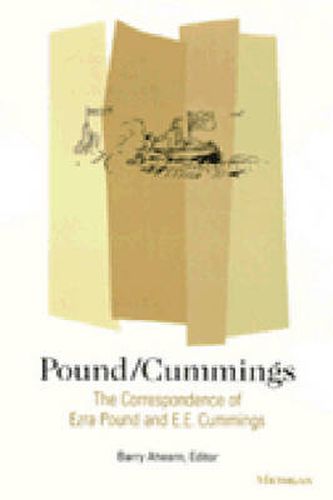Readings Newsletter
Become a Readings Member to make your shopping experience even easier.
Sign in or sign up for free!
You’re not far away from qualifying for FREE standard shipping within Australia
You’ve qualified for FREE standard shipping within Australia
The cart is loading…






Ezra Pound and E. E. Cummings carried on a long and varied correspondence from the 1920s until Cummings’s death in 1962. This volume collects all of the important letters from this important friendship in the history of modern poetry. Throughout the correspondence both poets reveal themselves and their beliefs to a remarkable degree. Pound entrusted to Cummings details of his political outlook in the 1930s and 1940s, including his opinions about Mussolini’s Italy. The letters to Cummings also shed new light on the question of Pound’s sanity after World War II. Although he was diagnosed as mentally unfit, the letters generally show no evidence of paranoia, only of his characteristic eccentricity.
Similarly, these letters should provoke a reevaluation of Cummings. Critics have treated Cummings’s political views as either strictly private matters or merely incidental to his art. The letters, however, show that Cummings’s radically conservative political opinions are wholly consistent with his poetics, and raise the question of the relation between Cummings’s political principles and his enthusiasm for particular forms (and particular stars) of mass entertainment. In addition to their political revelations, the letters are steeped in the literary climate–and literary gossip–of the times. Pound comments often and candidly on Cummings’s poetry and prose; both Pound and Cummings send light verse to each other. And the poets exchange anecdotes about such figures as Henry James, Wyndham Lewis, T. S. Eliot, Edmund Grosse, Max Eastman, and Aldous Huxley, among other writers. There is much here to interest and delight both fans and foes of Pound and Cummings. The book will be of primary importance to students and scholars of modern poetry, especially those who emphasize the intersection of literary works and political history. Barry Ahearn is Associate Professor of English, Tulane University.
$9.00 standard shipping within Australia
FREE standard shipping within Australia for orders over $100.00
Express & International shipping calculated at checkout
Ezra Pound and E. E. Cummings carried on a long and varied correspondence from the 1920s until Cummings’s death in 1962. This volume collects all of the important letters from this important friendship in the history of modern poetry. Throughout the correspondence both poets reveal themselves and their beliefs to a remarkable degree. Pound entrusted to Cummings details of his political outlook in the 1930s and 1940s, including his opinions about Mussolini’s Italy. The letters to Cummings also shed new light on the question of Pound’s sanity after World War II. Although he was diagnosed as mentally unfit, the letters generally show no evidence of paranoia, only of his characteristic eccentricity.
Similarly, these letters should provoke a reevaluation of Cummings. Critics have treated Cummings’s political views as either strictly private matters or merely incidental to his art. The letters, however, show that Cummings’s radically conservative political opinions are wholly consistent with his poetics, and raise the question of the relation between Cummings’s political principles and his enthusiasm for particular forms (and particular stars) of mass entertainment. In addition to their political revelations, the letters are steeped in the literary climate–and literary gossip–of the times. Pound comments often and candidly on Cummings’s poetry and prose; both Pound and Cummings send light verse to each other. And the poets exchange anecdotes about such figures as Henry James, Wyndham Lewis, T. S. Eliot, Edmund Grosse, Max Eastman, and Aldous Huxley, among other writers. There is much here to interest and delight both fans and foes of Pound and Cummings. The book will be of primary importance to students and scholars of modern poetry, especially those who emphasize the intersection of literary works and political history. Barry Ahearn is Associate Professor of English, Tulane University.